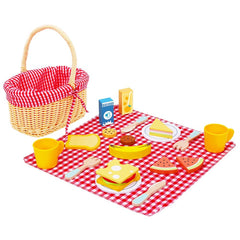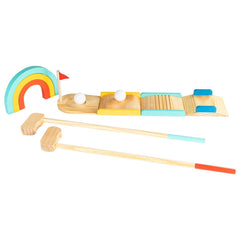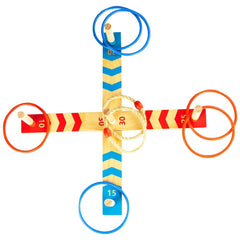Did you know that by the time the pregnancy test shows a positive line, your baby’s brain has already begun forming? Yes, the most complex part of the human body begins developing a mere two weeks after conception.
Scientific studies have proved that playing games helps in the intellectual, physical, and emotional development of a child. Since 90% of the human brain develops within the age of 5, it is important to include activities that foster creativity, motivation, problem-solving skills, and self-regulation. Mindful playing helps in the development of fine motor skills along with cognitive skills in children. Through the lessons they learn from development toys, kids can become well-rounded adults with positive self-esteem.
Are puzzles good for brain development?
Yes, playing with puzzle boards is not just a fun activity to keep your munchkins off the screen but also a great way to help improve visual perception, increase IQ, and enhance memory. Engaging in puzzle games such as Barnshenn Magnetic Fishing Game or Farm Animal Puzzle Game is an effective method to stimulate both cognitive regions. To solve puzzles, the logical left hemisphere and the creative right hemisphere must collaborate.
How do puzzles help in brain development?
Puzzles like Barnshenn Magnetic Farm and Kids Fruit Puzzle are the best puzzle games that help brain development and aid in growth and learning in the early years of a child. Like any other wooden toy, it has educational abilities as well, as listed below:
Visual Perception: Visual perception is an important pre-literacy skill that helps a child learn reading, writing, and arithmetic. Puzzles improve visual perception in different ways, such as improving visual memory, which is the ability to remember what is seen. It helps to acquire visual discrimination, which is the ability to identify similarities and differences.
Cognitive development: This process includes problem-solving skills, spatial awareness, and critical thinking. Solving age-appropriate puzzles helps children use their logic to solve the problem posed by the puzzle.
Development of fine and gross motor skills: As toddlers try to play with the small puzzle pieces or beads or wooden knobs, they learn to use their fingers and hands with precision. Rotating, picking up, and fitting pieces improve dexterity as well as hand-eye coordination. Their grip strength is built gradually as they learn to grasp pieces better.
Developing mathematical thinking and perception: Kids learn to sort according to shape, size, and colour. Children learn basic geometrical shapes as well as to recognise and predict visual patterns. The process develops their basic arithmetic skills and visual perception of shapes and geometric figures.
Increasing executive function skills of the brain: While interacting with other kids is important, it is also important for babies and toddlers to spend some time on their own. Solitary playtime encourages thinking and solving a task using one’s wits. Independent play begins as early as 4 months of age. Toddlers around 2-3 years may sometimes prefer to play by themselves. This strengthens the executive functioning skills of their brain. These skills help a person focus on a task, plan, prioritise, work towards a goal, self-regulate behaviour and emotions, and adapt to new and unexpected situations.
Improving attention span: Puzzles are an excellent means of developing a child’s fickle attention span. Solving a puzzle requires time and attention. Being a fun activity, a child’s brain is motivated to keep trying to solve the puzzle without feeling stressed out.
Teaching problem-solving skills Puzzles require logical and critical thinking in addition to analysing the information at hand. Such thinking is the first step to solving problems that crop up later on in life. Playing puzzle games teaches children to patiently analyse challenges and think creatively to solve problems.
Building confidence and flexibility: Self-assurance and self-esteem are important traits that enable children to stand up for themselves, cope with challenges, and have a positive growth mindset. These qualities help children grow into well-adjusted adults too.
Inspire Childhood!
Puzzles go a long way in making childhood happy, enjoyable, and instructive. Investing in the best puzzle games from Barnshenn is a great way to ensure the holistic growth of your child’s brain naturally. They have been crafted to inspire childhood.
Barnshenn Puzzle Game FAQs
1. What cognitive skills do puzzles develop in children?
Ans: Puzzles promote problem-solving and logical thinking skills in children. They promote brain development by engaging children in activities like counting, basic math, and colour and pattern recognition. They also foster hand-eye coordination and fine and gross motor skills.
2. At what age should I introduce puzzles to my child?
Ans: Barnshenn Puzzles are suitable for children aged one and above. Parents can start by helping children with large pieces that help boost their motor skills and dexterity. Gradually, you can move to more challenging puzzles when children are ready to take them up.
3. Do puzzles promote social skills?
Ans: Yes, puzzles help in promoting social skills as children interact and play with each other. The activity also develops teamwork skills and coordination abilities in children. They are especially beneficial for children in developing empathy and collaboration with others.
4. What should I look for when choosing puzzles for my child?
Ans: Choose the puzzle that best suits your child’s interests. Look for puzzles with large and sturdy pieces that stimulate motor skills. Choose theme-based puzzles according to your toddler’s interests, like animal themes, Christmas themes, or even counting-based puzzles.





